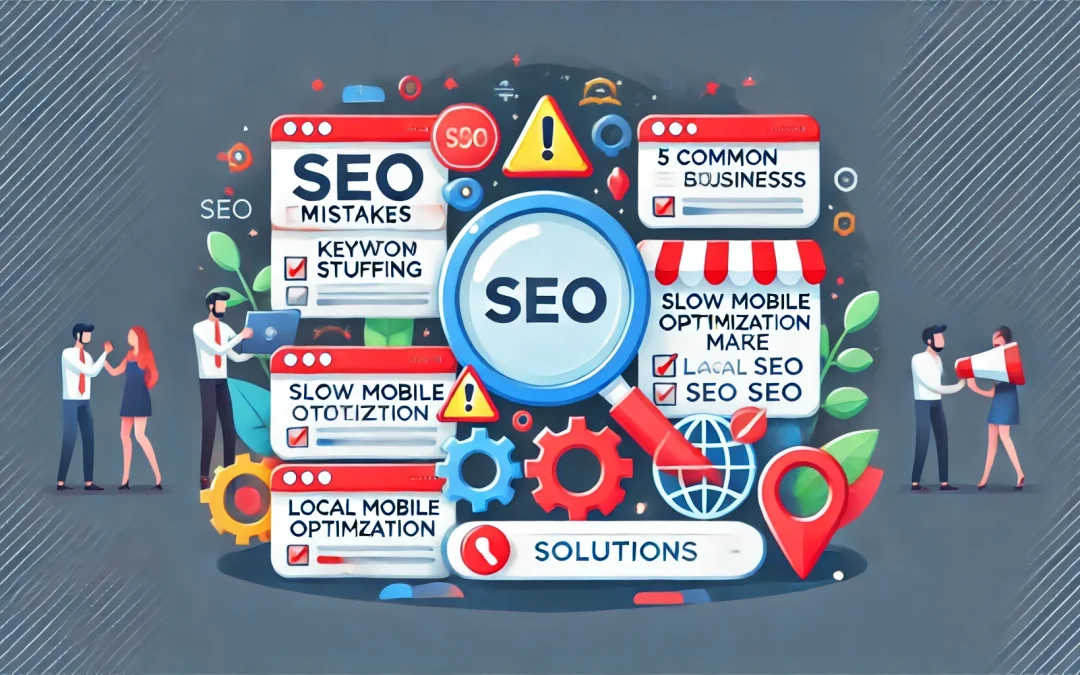Search engine optimization (SEO) is crucial for driving traffic to your website, but many small businesses struggle to get it right. With the constantly changing SEO landscape, it’s easy to make mistakes that can negatively impact your search engine rankings. In this blog, we’ll discuss the most common SEO mistakes small businesses make and how to fix them to ensure your site ranks higher and attracts more visitors.
1. Ignoring Local SEO
One of the biggest SEO mistakes small businesses make is neglecting local SEO. If you’re a small business targeting local customers, optimizing your site for local search results is essential. Focusing on broad, generic keywords can lead to wasted effort if your audience is primarily located in a specific geographic area.
Fix: Focus on local SEO by optimizing for location-based keywords such as “plumber in [city]” or “best bakery near me.” Ensure your Google Business Profile is up-to-date with accurate business information, including your address, phone number, and hours of operation. Encourage customers to leave reviews, as they play a key role in improving your local search ranking.
Additionally, make sure your website includes your location in key places, such as the title tags, meta descriptions, and within your content. You should also build local citations by getting your business listed in local directories.
2. Keyword Stuffing
Keyword stuffing—cramming as many keywords as possible into your content—is an outdated practice that can do more harm than good. While keywords are important for SEO, overusing them can make your content difficult to read and may result in penalties from search engines like Google. Search engines today prioritize quality content that provides value to users over content stuffed with keywords.
Fix: Instead of keyword stuffing, focus on creating high-quality content that naturally incorporates your target keywords. Aim for a keyword density between 1% and 1.5%, and ensure your keywords are relevant to the context. Use long-tail keywords and variations to avoid sounding repetitive. Remember, your content should always prioritize the reader’s experience over search engine algorithms.
3. Neglecting Mobile Optimization
With the majority of internet users accessing websites via mobile devices, not having a mobile-friendly website is a huge SEO mistake small businesses make. Google has made mobile-first indexing a priority, which means websites that aren’t optimized for mobile devices will rank lower in search results.
Fix: Ensure your website is fully responsive, meaning it adjusts to different screen sizes and works seamlessly on both desktop and mobile devices. Test your website’s mobile-friendliness using Google’s Mobile-Friendly Test tool. Pay attention to load times as well—compress images, minimize code, and optimize your site’s speed to provide a smooth experience for mobile users.
Additionally, ensure that buttons, links, and forms are easy to use on mobile devices. A mobile-friendly design will not only improve your search rankings but also enhance user experience, leading to higher engagement and conversions.
4. Overlooking On-Page SEO Elements
On-page SEO refers to the optimization of individual web pages to rank higher in search engines. Many small businesses neglect important on-page elements such as title tags, meta descriptions, header tags, and image alt text. Without these optimizations, your website may struggle to rank well even if the content itself is valuable.
Fix: Pay attention to on-page SEO by optimizing the following elements:
- Title Tags: Ensure each page has a unique and descriptive title tag that includes your target keyword. Keep it under 60 characters to avoid truncation in search results.
- Meta Descriptions: Write compelling meta descriptions for each page. Although meta descriptions don’t directly impact rankings, they can influence click-through rates, which indirectly boosts SEO.
- Header Tags (H1, H2, H3): Use header tags to structure your content and include keywords where appropriate. This helps search engines understand the hierarchy and relevance of your content.
- Image Alt Text: Optimize your images by including alt text that describes the image and incorporates relevant keywords. This also makes your site more accessible to visually impaired users and improves image search rankings.
By properly optimizing these on-page elements, you make it easier for search engines to understand your content and improve your chances of ranking higher.
5. Failing to Track SEO Performance
Many small businesses fail to track and measure their SEO performance, making it impossible to know what’s working and what’s not. Without monitoring key SEO metrics, you won’t be able to make data-driven decisions to improve your website’s ranking.
Fix: Use tools like Google Analytics and Google Search Console to monitor your website’s SEO performance. Pay attention to metrics such as:
- Organic Traffic: The number of visitors coming to your website through search engines.
- Bounce Rate: The percentage of visitors who leave your site after viewing only one page. A high bounce rate may indicate poor user experience or irrelevant content.
- Keyword Rankings: Track how your target keywords are ranking over time. Adjust your SEO strategy based on performance.
- Conversion Rate: Measure how well your SEO efforts are converting visitors into leads or customers.
Regularly reviewing these metrics allows you to identify areas for improvement and adjust your SEO strategy accordingly. By consistently monitoring your performance, you can ensure your efforts are paying off and that your site is continually optimized for search engines.
Conclusion
The success of your small business’s online presence largely depends on avoiding these SEO mistakes. By focusing on local SEO, avoiding keyword stuffing, optimizing for mobile, refining on-page SEO elements, and tracking performance, you can create a solid foundation for higher search rankings and more organic traffic.
At Intelemax, we specialize in helping small businesses avoid common SEO pitfalls and develop strategies that drive results. Contact us today to learn how we can help improve your SEO and grow your business.

